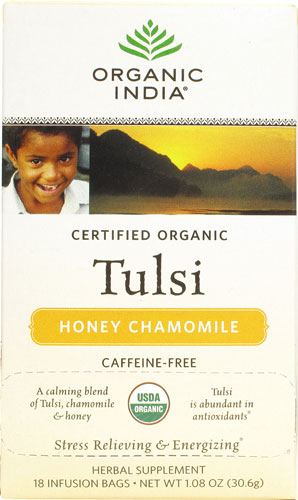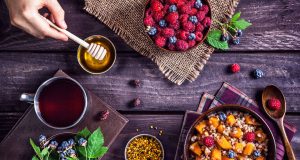My Favorite Teas for Bloating, IBS, and Regularity
I love talking to people on Spinach and Yoga facebook page. Recently one of Spinach and Yoga followers asked me about my favorite teas to soothe stomach. I replied almost right away but kept thinking about the topic for the next several days.
Teas are my favorite medicine. If you came to visit my apartment, you would see that I have a huge collection of teas. From Chinese green varieties, to dandelion, fennel, all kinds of mint, ginger, and other herbal varieties.
Functional Teas
I treat teas as medicine. I am deeply grateful for their almost immediate effect on my body and mood. Over the years I learned how to use teas to feel invigorated yet calm, focused yet never jittery, clear but not irritated. Looking back I realize that it took me quite some time of experimenting with various combination of herbs (just like food), finding the right time of day for each tea, and of course the best brands. Today I will share my favorites and explain the functionality of each one. Teas are listed starting with morning blends and moving to the evening ones.
I start my day by making a pot of tea with a blend of the Fennel tea, Peppermint and Light Green tea. Then I can have Shanti tea or Ginger in the afternoon, Coconut Cocoa Cuppa Chocolate Tea or Licorice tea as a dessert and finish my day with either chamomile of lavender.
 Fennel tea by Healhter’s Tummy teas – Fennel’s documented use goes back to ancient China, and the plant is mentioned in virtually every European work on herbal medicines from ancient times to the present. Fennel is listed as an official drug to be used for digestive problems. This herb is used daily as an after-meal digestive aid from Spain to India to Italy. If you’ve ever been offered pastel candy-colored seeds after a meal in an Indian restaurant, that was fennel. Fennel is naturally caffeine-free, has anti-spasmodic properties, and it stimulates the production of gastric juices. It’s useful for gastrointestinal and menstrual cramps, heartburn, diarrhea, colic, stomachaches, and indigestion. It is exceptionally beneficial for IBS bloating and gas. Drinking the tea every day will actually help prevent IBS bloating and gas in the first place, but if you’re already suffering from these very common Irritable Bowel Syndrome symptoms fennel will help relieve them.
Fennel tea by Healhter’s Tummy teas – Fennel’s documented use goes back to ancient China, and the plant is mentioned in virtually every European work on herbal medicines from ancient times to the present. Fennel is listed as an official drug to be used for digestive problems. This herb is used daily as an after-meal digestive aid from Spain to India to Italy. If you’ve ever been offered pastel candy-colored seeds after a meal in an Indian restaurant, that was fennel. Fennel is naturally caffeine-free, has anti-spasmodic properties, and it stimulates the production of gastric juices. It’s useful for gastrointestinal and menstrual cramps, heartburn, diarrhea, colic, stomachaches, and indigestion. It is exceptionally beneficial for IBS bloating and gas. Drinking the tea every day will actually help prevent IBS bloating and gas in the first place, but if you’re already suffering from these very common Irritable Bowel Syndrome symptoms fennel will help relieve them.- Peppermint tea by Healther’s Tummy teas – Mint is one of the oldest of herbs. It was used by the ancient Assyrians, and was common to the ancient Greeks and Romans, who recognized its pain-killing properties. Mint tea has been a favorite cure for indigestion since Biblical times. This peppermint tea specifically formulated for a high volatile oil content and medicinal strength for people with IBS. Internally, peppermint has an anti-spasmodic action, with a calming effect on the muscles of the stomach, intestinal tract, and uterus. Peppermint tea is extremely useful for indigestion, GI cramps, and relieving IBS pain and gut spasms. Peppermint is naturally caffeine-free, anti-bacterial, increases gastric juices, and relieves gas, nausea, vomiting, and morning sickness. Peppermint also contains essential oils that stimulate the gallbladder to secrete its store of bile, which the body uses to digest fats. It also improves the function of the muscles that line the stomach and intestines, relieves diarrhea, and has a calming, numbing effect on the entire GI tract.
- Light green by Tao of Tea – this green tea is not as astringent as other green teas and doesn’t irritated my fiery Pitta. It is smooth, very light, and pleasant to drink. While the caffeine is very low it is enough to feel invigorated without overtaxing the adrenals. It can help to stimulate elimination in the am without irritating digestion as coffee would.
- Ginger – ginger tea is great anytime and especially after meals if the meal was heavy. Fresh ginger is best but 3 Ginger by Pukka teas is great, too. It is 100% gingery goodness that just leaves me feeling warm all over. Perfect in cool weather. The taste is fabulous (since I LOVE ginger) and I appreciate that it includes turmeric, which is one of those foods we should consume more often as it is anti-inflammatory.
- Gaia Gas and Bloating Tea – It is a common occurrence to eat too quickly for lunch or eat foods that your body may not agree with because there is not enough time to cook. This may result in a feeling of fullness accompanied by digestive gas and bloating. This unique tea formulation combines herbs such as Peppermint, Caraway and Licorice Root with Fennel seed essential oil to sooth your digestive system and provide fast acting relief for occasional indigestion.
- Ayurvedic Tea Shanti by the Tao of Tea – This tea is not only for the belly but for the mind as well. It contains 100 percent Organic Holy Basil ‘Tulsi’ leaves, 100 percent Organic Fennel Seeds, 100 percent Organic Dried Orange Peel and 100 percent Organic Spearmint. Sweet with cooling undertones of fennel, orange and mint. Shanti means ‘peace within’. Ayurvedic teachings suggest a peace of mind to balance the spirit and physical health. Also known as ‘Tulsi’, Holy Basil is a sacred plant in India and is of great Ayurvedic and medicinal significance. It promotes longevity, contains many beneficial compounds known as phytochemicals, and has strong anti-oxidant, anti-bacterial, anti-viral and immune system enhancing properties. Tulsi is an adaptogen, meaning it helps the body adapt to stress.
- Coconut Cocoa Cuppa Chocolate Tea – A rich, exotic taste of this herbal infusion combines coconut, chocolate and caramel malted barley to produce a thick, naturally sweet, tropical cup. The delicious taste of both cocoa and carob belies their nutritional value. Enjoy at any latitude as a warming, low-calorie cup of dessert. Coconut Cocoa Cuppa Chocolate Tea was featured on NBC Today Show as one of the top 10 Skinny Foods all dieters should try and in Woman’s World.
 Licorice – a stomach soothing almost dessert-like herb. Licorice is indigenous to Greece, Italy, Spain, Syria, Iraq and southern China. The root penetrates deeply into the ground and is the part of the herb that contains an abundance of valuable properties. The root yields a substance known as glycyrrhizin or glycyrrhizic acid which is 50 times as sweet as sugar cane. Licorice helps to reduce dehydration of the colon and prevents constipation.
Licorice – a stomach soothing almost dessert-like herb. Licorice is indigenous to Greece, Italy, Spain, Syria, Iraq and southern China. The root penetrates deeply into the ground and is the part of the herb that contains an abundance of valuable properties. The root yields a substance known as glycyrrhizin or glycyrrhizic acid which is 50 times as sweet as sugar cane. Licorice helps to reduce dehydration of the colon and prevents constipation.
- Tulsi Honey Chamomile – This evening blend is caffeine-free and has stress relieving properties. It is soothing & relaxing. Tulsi is a powerful adaptogen and abundant in antioxidants. This tea has a smooth flavor of chamomile blossoms, reminiscent of apples dribbled with amber honey. Accompanied by the depth of the Tulsi leaf trio, this is the perfect tea for a soothing restorative moment. Throughout India, Tulsi is considered ” The Queen of Herbs” and is revered as a sacred plant infused with healing power. Traditionally grown in an earthen pot in every family home or garden, Tulsi (also know as Holy Basil) makes a delicious and refreshing tea that possesses wonderful health benefits that support the body’s natural immune system while relieving the body’s negative reaction to stress. Our stomach is closely connected to the nervous system so this tea is good for both.
- White Lavender – White Tea gently blended with French lavender. It is soft, light, and romantic. Lavender oil is useful for digestion as it increases the mobility of the intestine. The oil also stimulates the production of gastric juices and bile and thus aids in treating indigestion, stomach pain, colic, flatulence, vomiting and diarrhea.
Your turn: What are your favorite teas?
If you want more tips help reduce gas, bloating, and constipation, join me for the upcoming online class Yoga for Bloating and Constipation.











